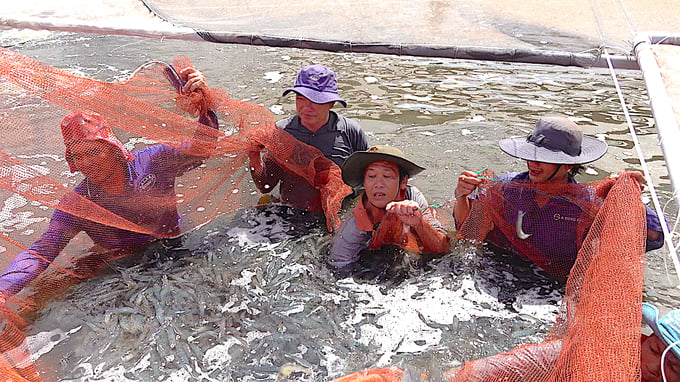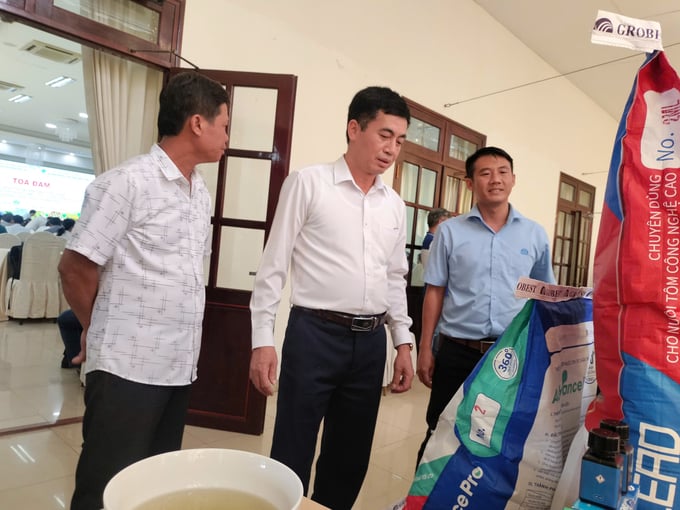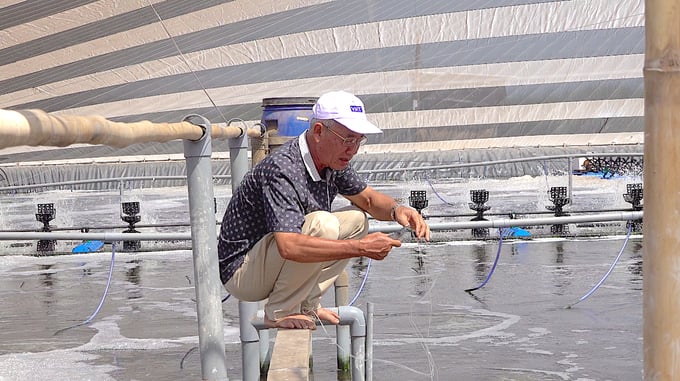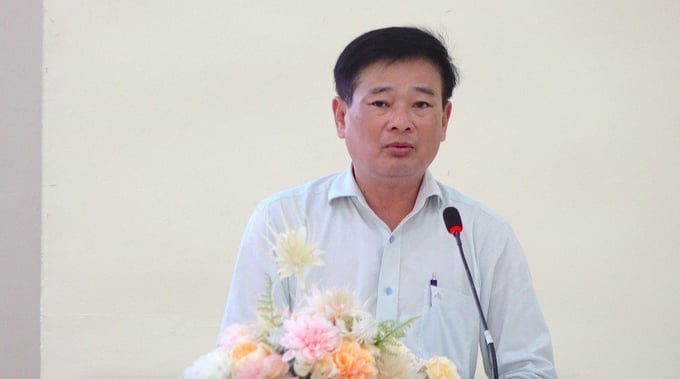May 21, 2025 | 07:49 GMT +7
May 21, 2025 | 07:49 GMT +7
Hotline: 0913.378.918
May 21, 2025 | 07:49 GMT +7
Hotline: 0913.378.918
On November 25 in Ben Tre province, the National Centre for Agricultural Extension held a seminar on "Applying scientific and technological advancements for sustainable brackish water shrimp farming, reducing production costs, emissions and enhancing efficiency".

The price of raw shrimp has shown positive signs in the closing days of the year. Photo: Minh Dam.
According to the Directorate of Fisheries, as of November 2024, the total area for brackish water shrimp farming in the Mekong Delta is approximately 730.000 hectares, similar to the same period in 2023. The production volume is around 1.1 million tons, with white-legged shrimp accounting for about 795.800 tons, achieving 105% of last year's output.
Nevertheless, 2024 continues to be a difficult year for Vietnam's shrimp industry, primarily due to unfavorable weather conditions, the complicated spread of diseases, increasing costs of raw materials, and a number of stringent obstacles in the consumption market. Additionally, the prices of shrimp have been unstable, with a downward trend, further affecting profitability. As a result, shrimp farmers have yet to see significant profits.
Mr. Dang Xuan Truong, Head of the Aquaculture Promotion Department at the National Agricultural Extension Center, shared: "In the first ten months of the year, the total area of aquaculture affected by damage was approximately 22.269 hectares, primarily impacting brackish water shrimp farms. This represents an 11.2% decrease compared to the same period last year. Specifically, in October 2024, the shrimp farming sector experienced disease outbreaks across 430 hectares in 8 provinces and cities, marking a 32.8% increase in affected areas compared to the previous year. The two main diseases responsible for the damage were necrotizing hepatopancreatitis and white spot syndrome".

Mr. Hoang Van Hong (center), Deputy Director of the National Agricultural Extension Center, visited the shrimp feed products of Grobest Company. Photo: Minh Dam.
During the seminar, experts addressed numerous questions raised by the participants and offered various solutions to help shrimp farmers overcome the difficulties they have faced in recent times. These solutions encompassed technical aspects, the application of farming technologies, the use of additives and the adoption of biotechnology, all aimed at reducing production costs.
Additionally, the experts stressed the importance of effective management of the shrimp farming environment, including measures to control diseases. They also highlighted the need for farmers to use environmental management tools and equipment to create the most efficient production conditions possible.
Moreover, the seminar provided the farmers with valuable information on trustworthy companies, especially those involved in shrimp breeding, feed production, pharmaceuticals and chemicals.
Mr. Le Van Khoa, the National Technical Director of Grobest Industrial Vietnam Co., Ltd., explained that over the past four years, the company has successfully launched two shrimp farming models, Grofarm and Grofarm Pro. These models focus on optimizing nutrition in intensive white-legged shrimp farming, which has contributed to reducing production costs while ensuring environmental sustainability. The farming process designed by Grobest has led to a 10-15% reduction in shrimp production costs, bringing the cost down to approximately 2.9 USD/kg of finished raw shrimp. This significant cost reduction has greatly enhanced the competitiveness of Vietnamese shrimp in the global market.
He further elaborated: "We use carefully selected nutritional components with appropriate protein content that not only increase the success rates of shrimp farming but also help to reduce costs and promote environmental protection. Specifically, in Ben Tre province, the expansion of industrial shrimp farming, in line with the provincial development plan, will inevitably create environmental pressure. To address this, we have introduced a feed product with 36% protein that helps alleviate environmental stress and reduce emissions".

High-tech shrimp farming in Thanh Phu District, Ben Tre Province. Photo: Minh Dam.
According to Mr. Hoang Van Hong, Deputy Director of the National Agricultural Extension Center, in order to ensure the sustainable development of the shrimp industry in the Mekong Delta, it is essential to develop a high-quality shrimp seed production system, advance farming technologies, establish concentrated farming zones and invest in upgrading the infrastructure of farming areas. Alongside this, it is important to promote the development of cooperatives and linkages for product consumption, improve the quality of human resources and enhance production organization.
Ben Tre is one of the provinces making significant strides in the development of brackish water shrimp farming. It ranks fifth nationwide and fourth in the Mekong Delta region (after Ca Mau, Kien Giang, Bac Lieu and Soc Trang) in terms of shrimp farming expansion. The province has a potential aquaculture area of 50.000 hectares and has already utilized approximately 47.800 hectares for farming, with 36.000 hectares dedicated to brackish water shrimp cultivation.

Mr. Nguyen Van Buoi, Deputy Director of the Department of Agriculture and Rural Development of Ben Tre Province. Photo: Minh Dam.
According to Mr. Nguyen Van Buoi, the Deputy Director of the Department of Agriculture and Rural Development of Ben Tre Province, the brackish water shrimp farming industry in the province has experienced rapid development since the year 2000, with notable growth in intensive and semi-intensive shrimp farming methods, and more recently, the introduction of high-tech shrimp farming. While the industry has faced various challenges and fluctuations over the years, shrimp farming in Ben Tre has managed to maintain a solid and sustainable growth trajectory. Many high-tech shrimp farming models have shown remarkable results in terms of efficiency and profitability.
Looking ahead, it is projected that by the end of 2024, the total aquaculture production in Ben Tre will reach approximately 329.000 tons. The productivity of various farming models has continuously improved and advanced. For instance, intensive white shrimp farming yields between 10 to 12 tons/ha/crop, intensive black tiger shrimp farming yields around 6 to 8 tons/ha per crop, while high-tech shrimp farming models are expected to yield between 60 and 80 tons/ha. Additionally, extensive shrimp farming integrated with rice cultivation can produce between 150 and 200kg/ha annually.
Ben Tre Province is focused on integrating scientific and technological advancements into its production processes to improve productivity, create high-quality products, and reduce production costs, thereby enhancing the competitiveness of its products. To achieve this, the province plans to collaborate with research institutes and universities to promote the research and application of new technologies in aquaculture, particularly breakthrough technologies that are suitable for each stage of the production chain.
It is anticipated that from the third quarter of 2024 to the first quarter of 2025, the Vietnamese shrimp industry will benefit from several favorable factors. These include the continued growth in global demand for shrimp, China's tightening of shrimp imports from Ecuador, and the United States considering Vietnam's status as a market economy, which could result in the lowest anti-subsidy tariffs on Vietnamese warm-water shrimp.
Translated by Phuong Linh

(VAN) Khanh Hoa is investing over 545 billion VND to develop 240 hectares of high-tech marine aquaculture in order to guarantee a consistent supply of seafood exports and achieve the USD 1 billion target.

(VAN) Minister of Agriculture and Environment Do Duc Duy held a meeting with Soopakij Chearavanont, Chairman of C.P. Group, on May 15.
/2025/05/16/3800-0-nongnghiep-143756.jpg)
(VAN) Suntory PepsiCo Vietnam coordinated with the Ministry of Education and Training to implement an education program on water conservation, reaching nearly 1 million primary school students nationwide.

(VAN) Vietnam’s TH Group officially put its high-tech fresh milk processing plant into operation in the Russian Federation, marking a historic moment as the first TH true MILK cartons were produced in Russia.

(VAN) Use of high-quality broodstock and biotechnology is regarded as the most effective approach to ensuring sustainable and economically viable shrimp aquaculture ahead of climate change and the emergence of increasingly intricate disease patterns.

(VAN) Carbon farming is a form of agricultural practices that helps absorb more greenhouse gases than it emits, through smart management of soil, crops, and livestock.

(VAN) This is a key content of the Memorandum of Understanding recently signed between the Vietnam Fisheries Society and Kunihiro Inc of Japan.